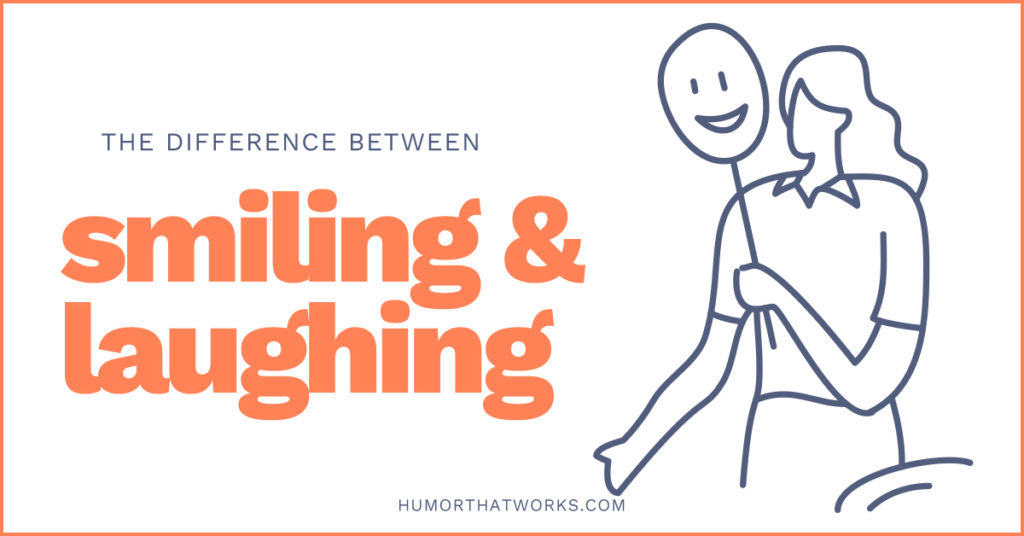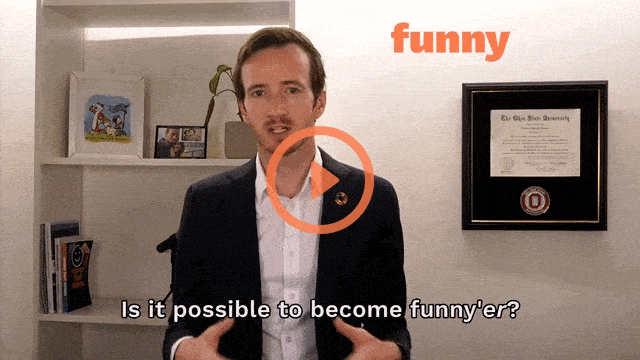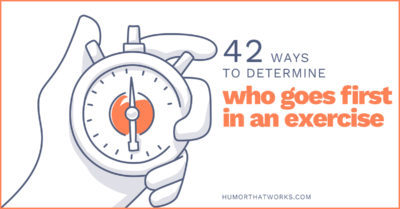Smiling and laughing are often associated together, and while they often occur together, there is a distinct difference between smiling and laughing. Research by Alleen Pace Nilsen and Don L.F. Nilsen explores the difference between smiling and laughing in more detail:
“Smiles are more likely to express feelings of satisfaction or good will, while laughter comes from surprise or a recognition of an incongruity.” (page 184)
Smiles are most often connected to a positive experience, while laughing is related to something unexpected, but not necessarily positive. And while smiling and laughing can be faked, they’re most natural cause comes from humor.
In fact, the difference between smiling and laughing is similar to the difference between humor and comedy. Laughing is generally evoked by something being funny (aka comedy) – a joke or story that sets an expectation and then breaks it. Humor, which can be funny, can also just elicit positive emotions – often signaled by smiling.
But perhaps the biggest difference between smiling and laughing is that smiling is personal and laughing is public:
“Laughter is a social phenomenon. That’s why ‘getting the giggles’ never happens when we are alone. In contrast, people often smile when they are reading or even when they are having private thoughts.” (page 185)
So, who cares about the difference between Smiling and Laughing?
How could you say such a thing! Seriously, we should all care about the difference between smiling and laughing to learn more about happiness. Another takeaway is that when working to incorporate humor into the workplace, you are more likely to elicit smiles than laughter. Why? Because there is a fear of laughing in the office, and rather than publicly express that an employee finds something funny, they’re more likely to privately enjoy the moment.
So as you attempt humor in the office, don’t worry about not hearing any laughter – instead look for the smiles on your co-workers faces as they enjoy the benefits of humor.
Source: Encyclopedia of 20th-Century American Humor by Alleen Nilsen and Don L.F. Nilsen. Westport, CT, 2000.





As for me the best explanation about it is this: what would be the difference if suddenly a lady smiles at you or the same lady suddenly laughs at you? How would you feel about if you are interested in that lady? Would your emotions be the same? In the first case you might think she likes you as well and even wonder if you can get the chance to start a new relationship, in the the second one you might feel embarrassed and even frustrated if the lady loudly laughs at you in front of a lot of people.
As for me the best explanation about it is this: what would be the difference if suddenly a lady smiles at you or the same lady suddenly laughs at you? How would you feel about if you are interested in that lady? Would your emotions be the same? In the first case you might think she likes you as well and even wonder if you can get the chance to start a new relationship, in the the second one you might feel embarrassed and even frustrated if the lady loudly laughs at you in front of a lot of people.
I was in confusion for so many days this minute but practical explanation superb
It is very enthusiastic …I learnt very deep differences between laugh and smile..
i really enjoy this topic differnce between smile and laughing
I never thought deeply the interesting part in between Lough and Smile. Enjoyable.